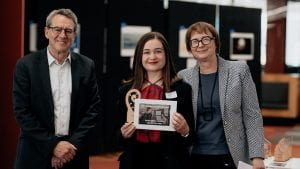
Professor Jim Metson, Pecha Kucha winner Judith Glasson and Professor Caroline Daley
Congratulations Judith Glasson
https://www.auckland.ac.nz/en/news/2022/10/19/sgs-research-showcase-winners-announced.html
First place in the Pecha Kucha category went to Judith Glasson, who is working between the Department of Chemical and Materials Engineering and the Department of Ophthalmology on the improvement of artificial corneal technology.
Judith’s research focus is inspired by her keen interest in the field of the field of regenerative medicine, and her dream is to develop functional grafts that patients can receive to restore vision and improve quality of life. She was recently awarded the P J Smith Travelling Fellowship for a collaboration with Universities of Sydney and Wollongong in February 2023.
She says that exploring the submissions from the other finalists from across the University was a highlight of the SGS Research Showcase.
“I really enjoy science communication, and finding fun new ways to explain my area of interest to my peers and the public. I had never tried a Pecha Kucha format before, so it was a nice challenge.
“It was also wonderful to see all the other submissions and get a bite-sized taste of so many research topics. Although I didn’t participate in it, I adored the research image section. As someone in a field dominated by numbers, graphs and cell counts, seeing artistic representations of research was very inspiring.”
Congratulations Fanglei Tong for being awarded a place on the Dean’s list!
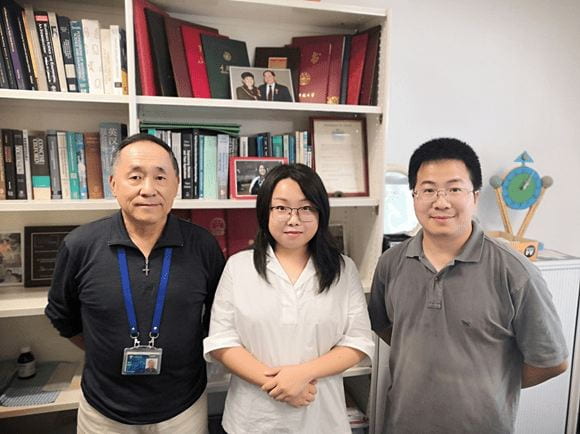
Professor Wei Gao, Fanglei Tong, Dr Shanghai Wei
We congratulate CHEMMAT’s Fanglei Tong for being placed on the Dean’s list! This is a well deserved recognition of all her hard work and research excellence.
Fanglei completed her PhD programme and passed her oral examination on 18 August 2022.
Supervisors: Dr Shanghai Wei/Professor Wei Gao, and she was supported by a CSC scholarship
Thesis title: Magnesium Alloys as Anodes for Neutral Aqueous Magnesium-Air Batteries
Fanglei has made good contributions on the important energy storage system of Mg-Air batteries. She studied the self-corrosion and passivation layer Mg(OH)2 accumulation problems, and developed a new electrode system of Mg-Zn-Sn alloy with much improved performance and energy efficiency.
Fanglei has completed her PhD study within three years and published 6 papers in reputable journals.
Congratulations Emma Brown
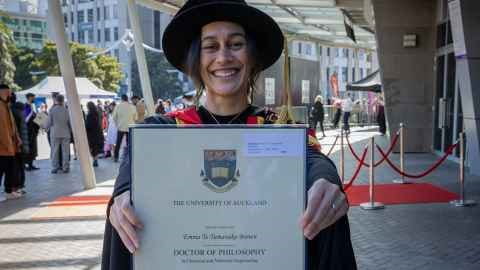
(Picture credit – Folko Boermans)
In May 2022, Dr Emma Te Tūmanako Brown was awarded her PhD in Chemical and Materials Engineering from the University of Auckland. Emma obtained her first degree in 2014 when she received a Bachelor of Engineering (Hons) in Chemical and Materials Engineering from our department. She then went on to work as a process engineer with NZ Steel. However, she was keen to develop her academic side further and returned to the department to embark on doctoral studies, conducting cartilage research with Professor Ashvin Thambyah.
Emma’s research involved studying the complex interplay of fluid and solid mechanics in biological weight-bearing tissues, such as cartilage. Studying the effects of tissue hydrostatic stresses in the water-rich collagen matrix, Emma investigated how subtle submicron scale collagen network changes can cause dramatic effects on macro-scale cartilage mechanics. The significance of her work was in providing new insight on the elusive early to pre-osteoarthritic state of joint tissues.
As a wahine Māori researcher (Ngāpuhi, Ngāti Maru, Ngāti Pukenga, Ngāi Te Rangi) Emma was very interested in staying in research for a period of time, however, she was also swayed by her passion wanting to understand research impact in a setting that had a policy and national wellbeing overlap. Thus, Emma has recently joined the team of The Prime Minister’s Chief Science Advisor, Professor Dame Juliet Gerrard. Her new role as a research analyst and writer will help Emma get closely involved in current hot topic issues around science and how it influences society, people, and culture.
Congratulations Syeda Bokhari
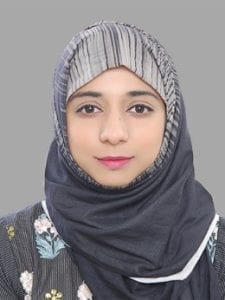
Syeda’s PhD thesis entitled ‘graphene-based hybrid electrodes for the supercapacitor systems’ details the hydrothermal synthesis and electrochemical performance of graphene-mixed phase metal disulfide nanocomposites for supercapacitor applications. The designed nanocomposites performed exceptionally well in aqueous electrolyte systems in an extended voltage window. The output is a high capacitance and energy-power density, long-life cycle, and superior capacitance retention, as well as a high columbic efficiency, which suggests the potential of the hybrid nanocomposites for supercapacitors.
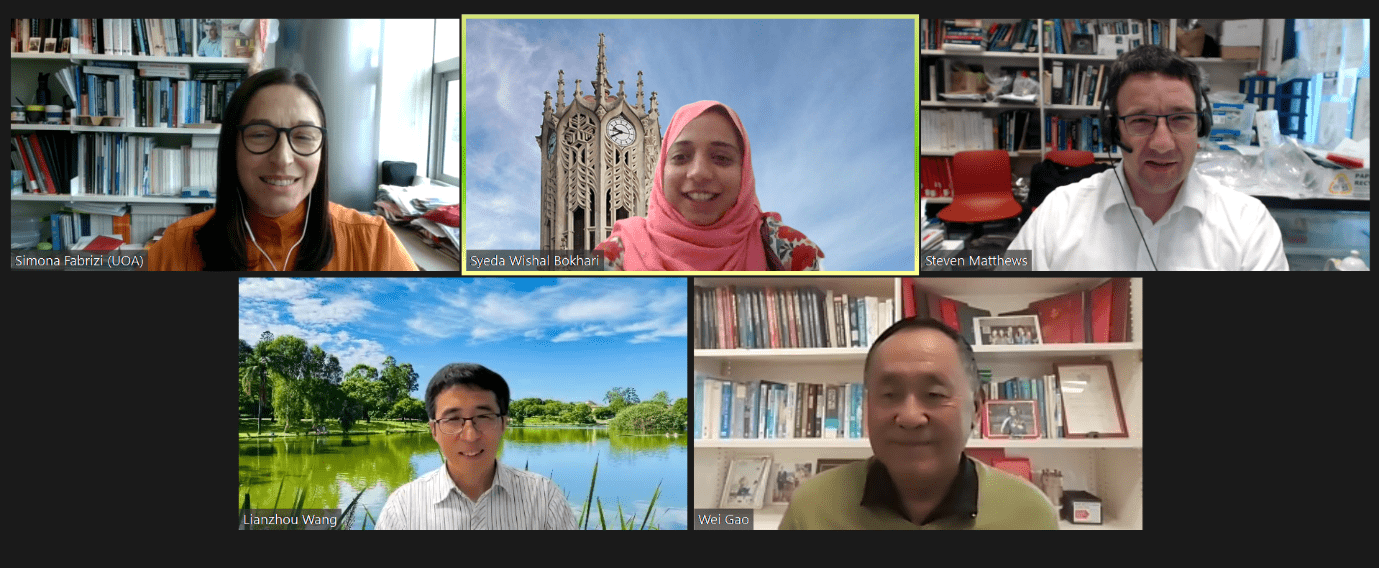
Congratulations Ruby-Jean Clark

CHEMMAT PhD candidate Ruby-Jean Clark with her supervisor Professor Mohammed Farid
Ruby-Jean Clark successfully defended her PhD thesis titled “Salt hydrates for thermochemical energy storage” whilst under the supervision of Professor Mohammed Farid. They recently travelled through U.S.A. attending conferences and developing collaboration links
Congratulations Zhipeng Zhang
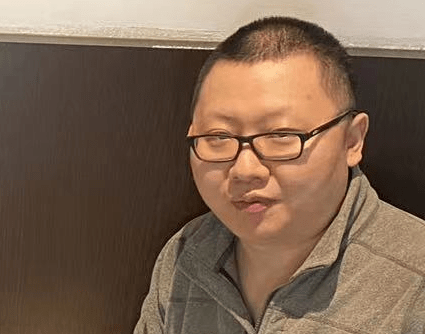
Zhipeng Zhang defended his thesis on 26 August 2022 and he passed his oral defense with very few minor revisions. Zhipeng could address all the questions well, and the examiners were impressed by his research work.
Thesis title: Seawater as Magnesium Source for Struvite Recovery from Wastewater
Supervisors: Dr Filicia Wicaksana, Co-Supervisor: Dr Wei Yu
Abstract:
Phosphorus is essential for living organisms and is widely used in various industries. Phosphorus naturally exists as phosphates (PO43-) and is mainly exploited from phosphate ores, a mineral that is predicted to be exhausted in the next century. Phosphorus released into water bodies can cause eutrophication issues. Hence, phosphorus recovery from agricultural wastewater is one option to tackle future phosphorus shortage and eutrophication issues.
This study involved phosphorus recovery from swine wastewater through precipitation of struvite, a valuable slow-release fertiliser, by assessing the effect of ionic strength and the presence of acetic acid in feed water on phosphorus recovery. Results showed that the phosphorus removal process has reasonable robust control. The process was not sensitive to the ionic strength and the presence of acetic acid. Struvite produced with magnesium source from nanofiltration retentate of New Zealand seawater demonstrated similar characteristics as the one produced with pure magnesium chloride reagent. In addition to this, a soft sensor has been successfully developed using shape factors of struvite, ionic strength, and saturation index to predict phosphorus removal and struvite purity, allowing real-time monitoring of struvite quality. Findings from this study also indicated the potential of struvite and K-struvite for the immobilisation of heavy metals from contaminated soil.
Congratulations Tingxuan Yang

Thesis title: Structure Design and Luminescence Control of Eu2+-doped Orthorhombic Phosphors for Solid-State Lighting Applications
Supervisors: Prof Peng Cao, Dr Saifang Huang
Abstract:
Next-generation solid-state lighting devices urge the innovation of bright and robust phosphors. Most of the current phosphors either have low quantum efficiencies (internal and external, IQE/EQE) or have poor luminescence thermal stability, significantly affecting the performance of phosphor-converted white light emitting diodes (pc-WLEDs).
Our work focuses on the structure design, performance regulation and high-performance-LED application research of Eu2+-doped Orthorhombic phosphors. Based on β-K2SO4 with various structures, a series of new narrow-band blue phosphors and narrow-band green phosphors were developed through the co-substitution strategy. It is our intention that the results arising from this study could shed new light on enhancing the overall performance of LED phosphors.
Congratulations Wen Zhang

PhD Thesis title: Carbon-based transition metal compounds for high-performance electrochemical energy storage devices
Supervisors: Professor Peng Cao, Dr Saifang Huang
Brief introduction:
This project was mainly focused on three types of transition metal compounds, their electrochemical performance and their applications for aqueous alkaline Zn-Ni batteries and supercapacitors. A template-assisted wet chemistry method was developed to synthesize NiCo layered double hydroxide (LDH) delineated on hollow carbon spheres.
The assembled asymmetric hybrid supercapacitor exhibits rapid electrokinetics and excellent cycling performance. Another sol-gel method was developed to synthesize a ternary metal oxide, which has demonstrated fast charging-discharging and good rate performance.
Congratulations Ting Zhang
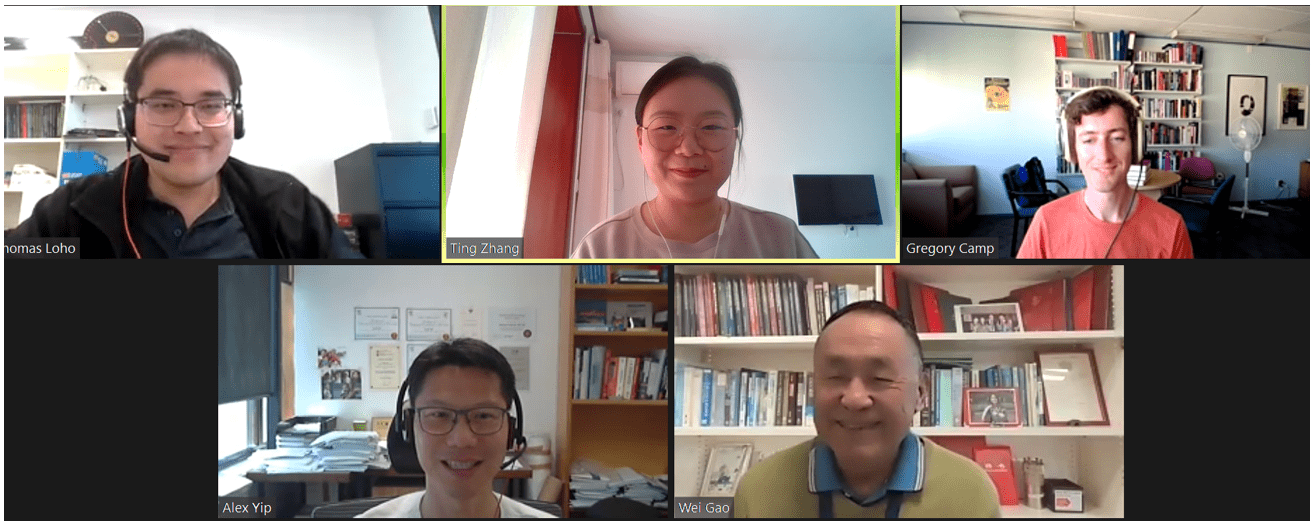
Ting Zhang has successfully passed her PhD thesis oral examination. The Examiners gave her very good comments.
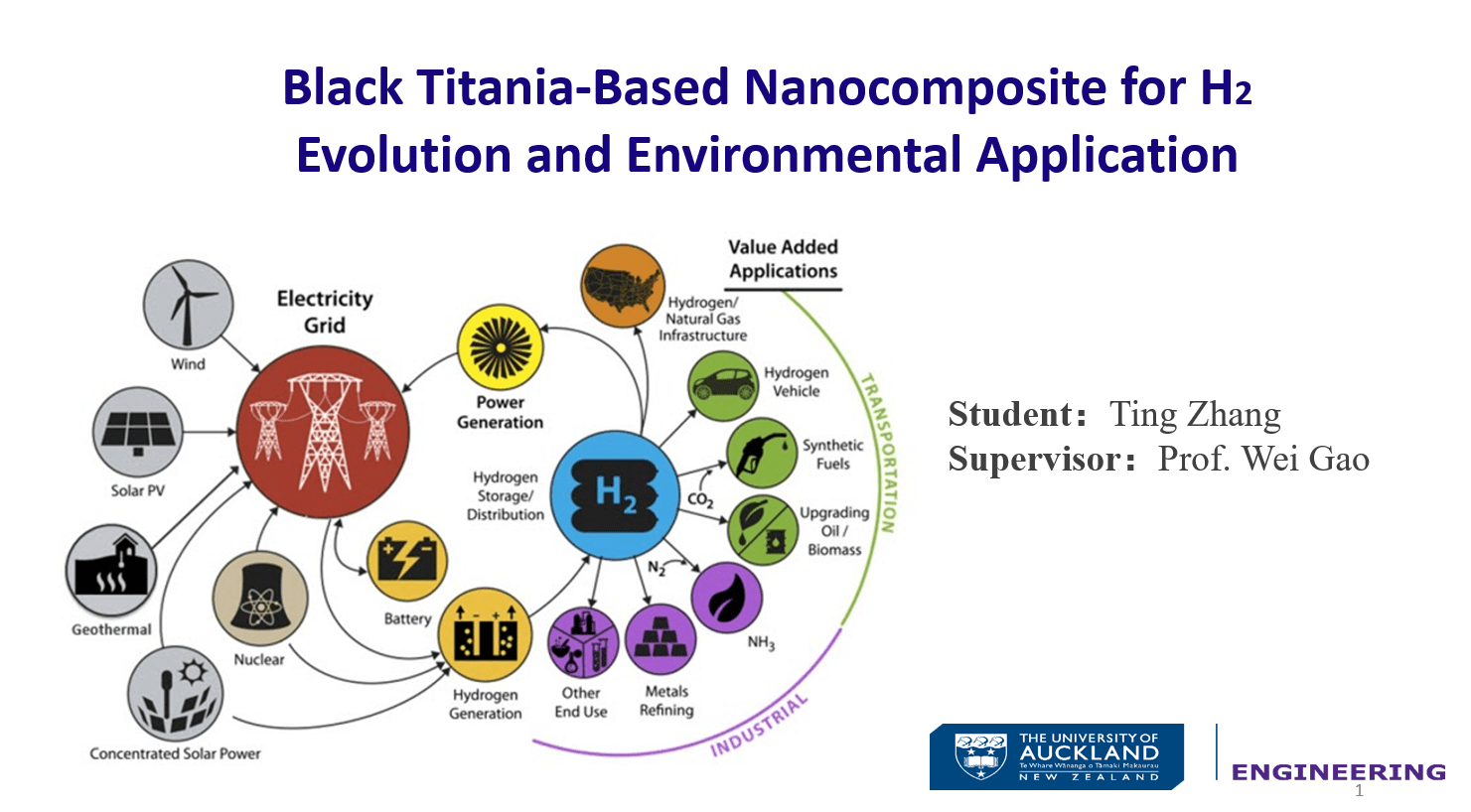
Congratulations Isaac Severinsen

Our PhD student Isaac Severinsen received a postgraduate participation award for the FIPSE, Foundations of Innovation in Process Systems Engineering Conference this year. It is a biennial invitation-only conference on the fundamentals of chemical engineering modelling, control, and optimisation held in Greece.
Numbers are limited to no more than 50 attendees drawn from high profile academics and industry practitioners globally in the field. The conference leads to the publication of three white papers on different new developments in the field.
Isaac’s supervisor, Professor Brent Young has attended the past four conferences presented on the research Dr Wei Yu and Brent lead, and contributed to several of the white papers.
It is a great honour for Isaac and a double honour for our research group for Isaac to receive this award.